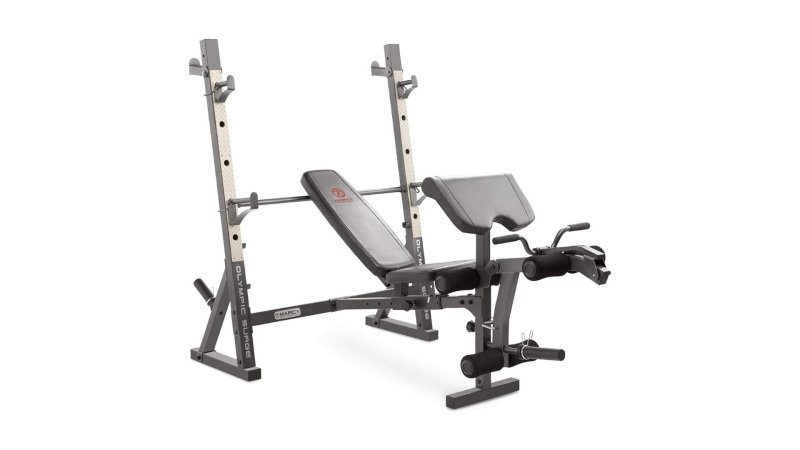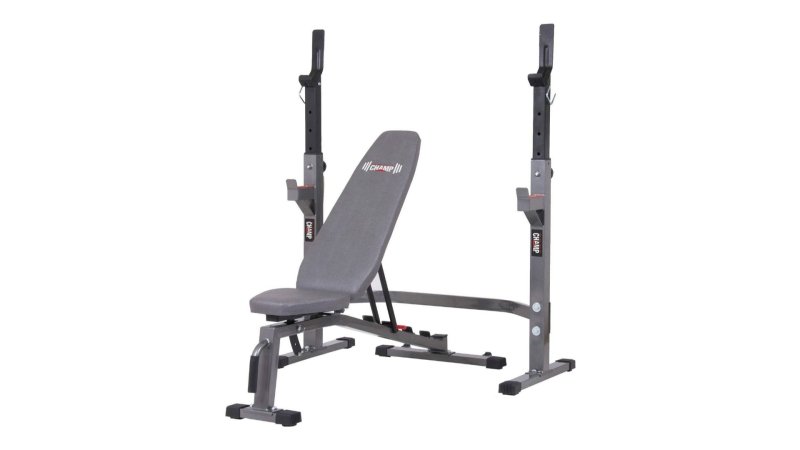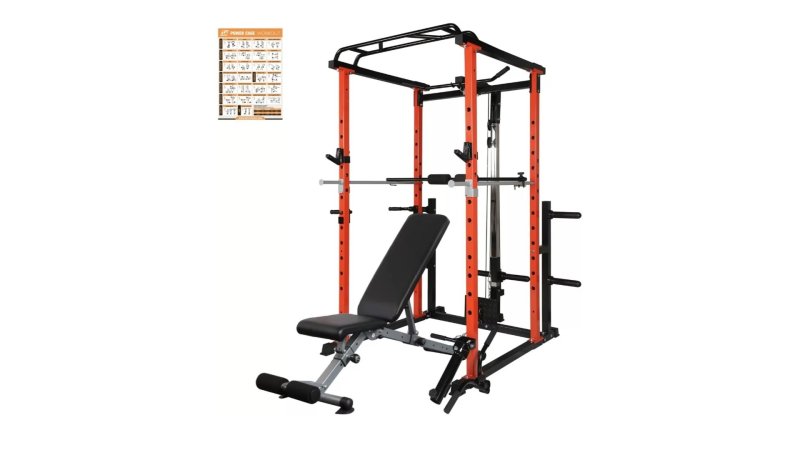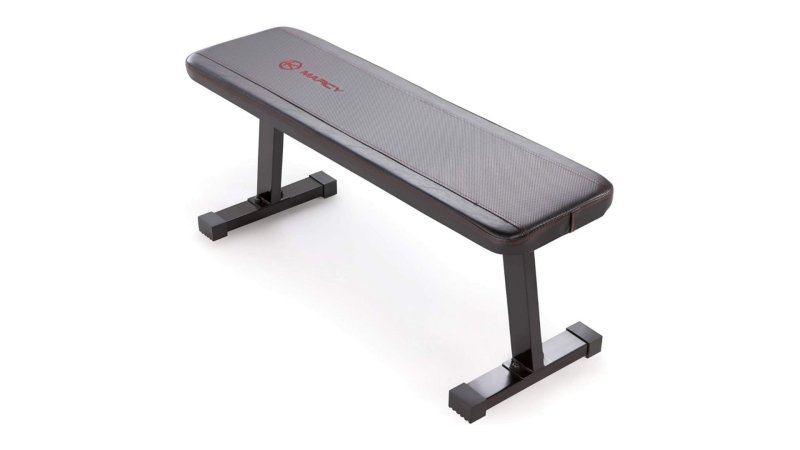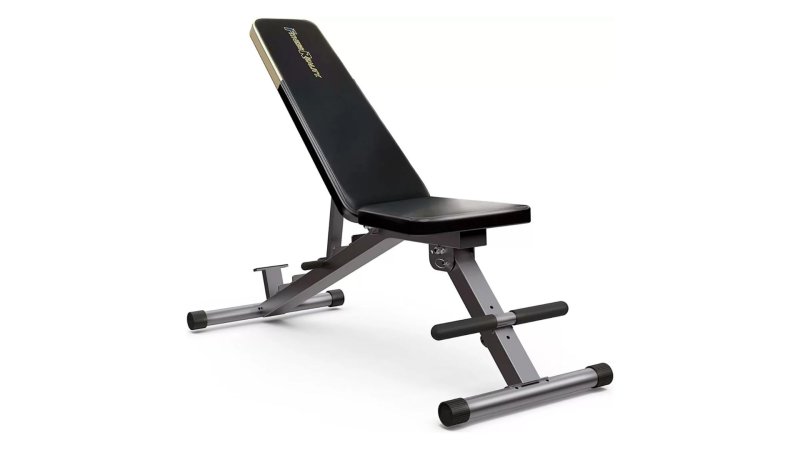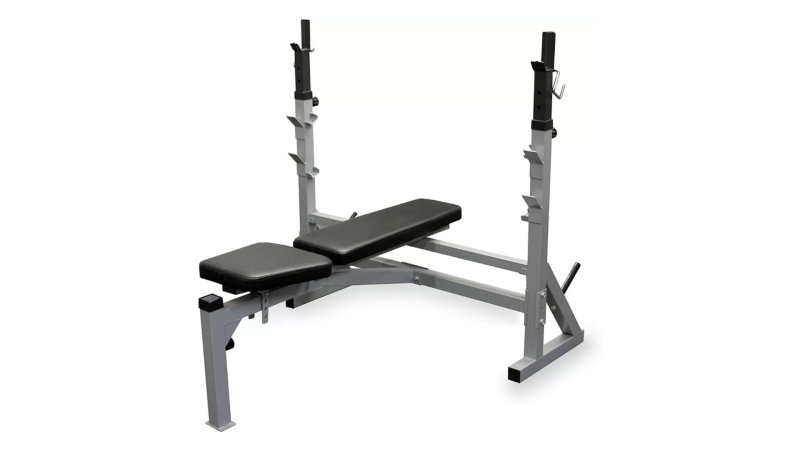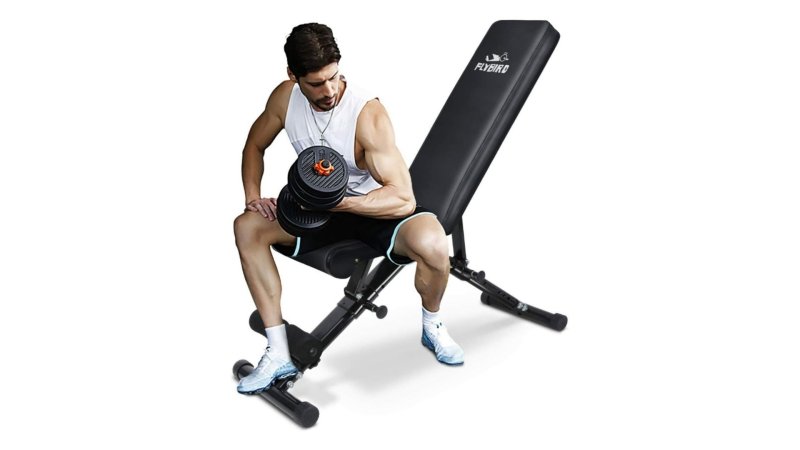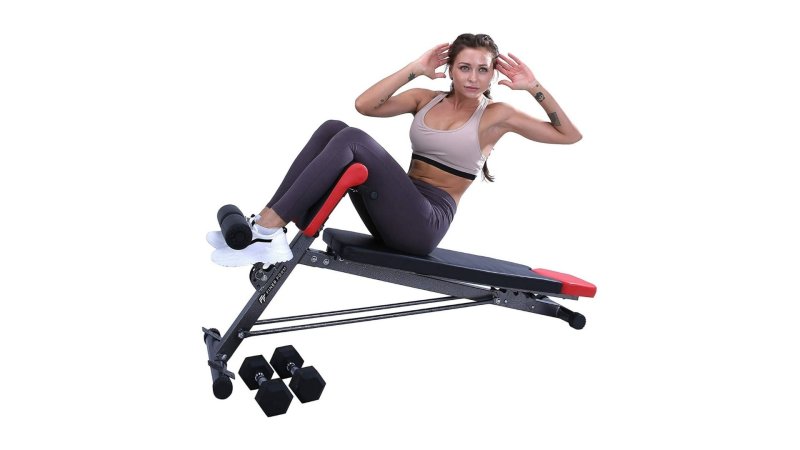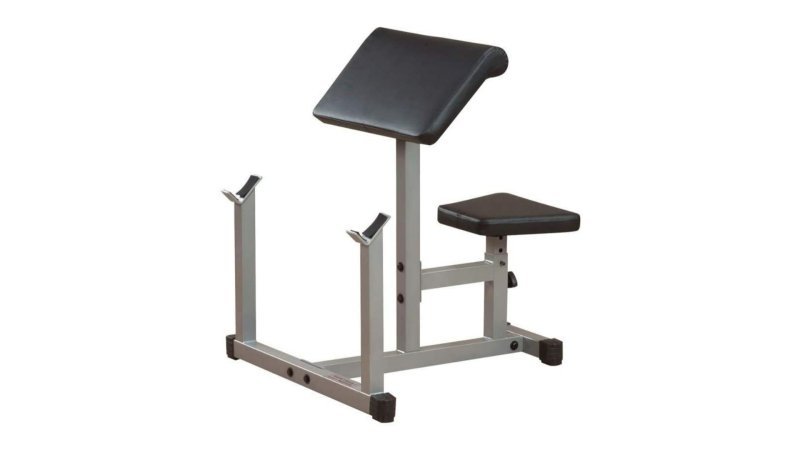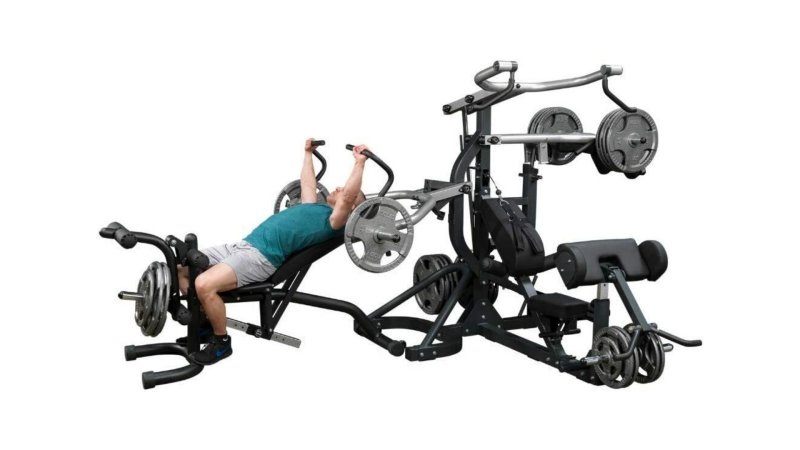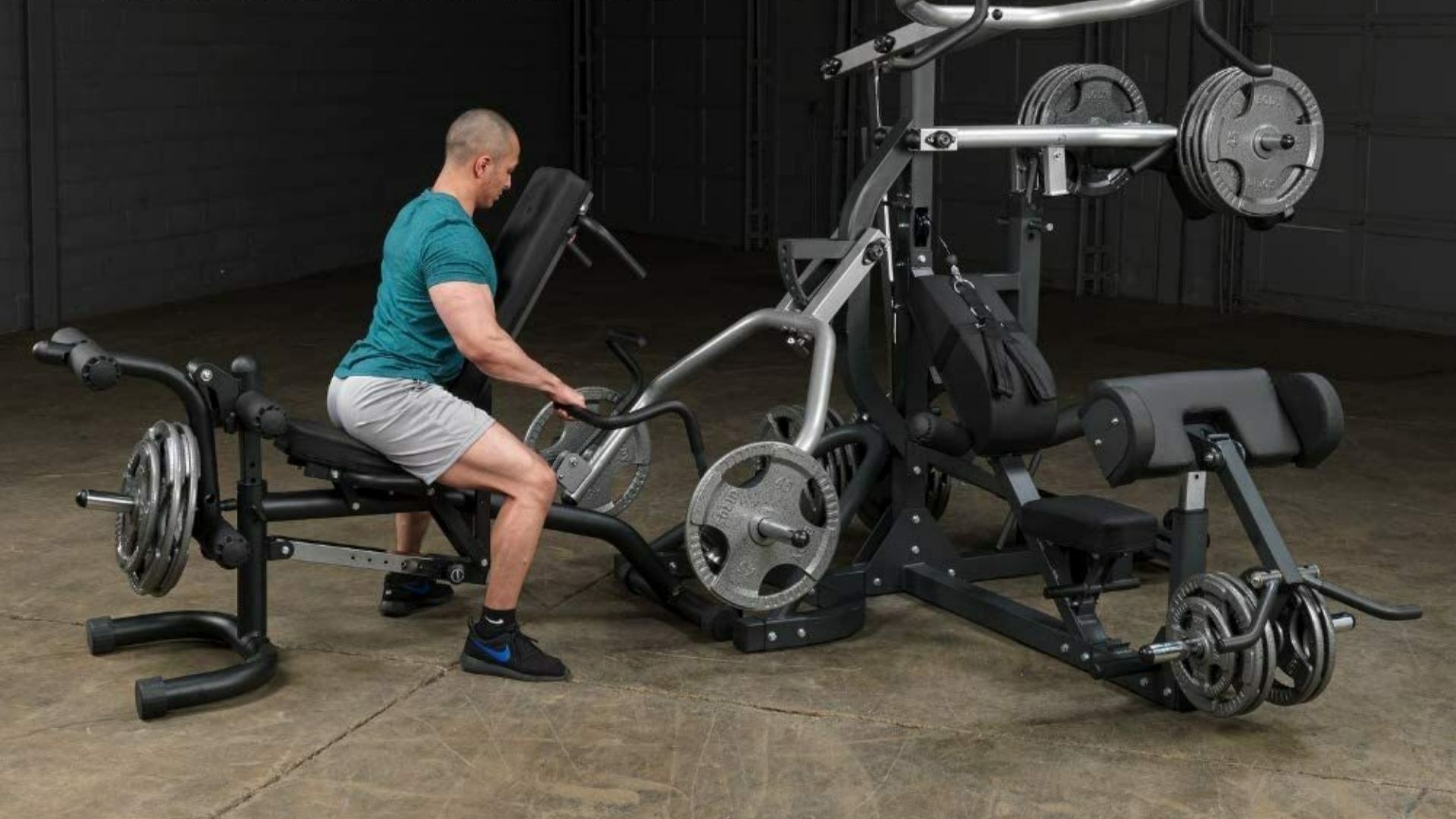

We may earn revenue from the products available on this page and participate in affiliate programs.
There is no way that you’ve been to a gym without seeing a weight bench, let alone used one. Even Planet Fitness has weight benches from what I hear (I’ve never personally stepped inside of one). If you don’t regularly incorporate one into your workout, you’re missing out on some great benefits, some of which I wasn’t even aware of when I was younger.
In high school, I worked out using barbells and cable machines. I didn’t get serious workouts with a weight bench until I joined the military. So I remember quite vividly my first chest workout after a four-hour vehicle patrol in the middle of the night. A more senior Marine and I did almost every variation of chest presses we could with dumbbells. I was sore for days.
A weight bench is integral to weightlifting workouts and bodybuilding routines because they allow you to put different stresses on the muscles. Essentially, they allow you to manipulate gravity to increase your gains. Bruh. We’re talking about game-changing variations that can help you build muscle or burn fat. But how do you know which one to buy for your home gym? Let’s take a look at how these benches stack up.
Best Overall
Marcy Fullbody Workout Bench
Pros
- High weight capacity
- Includes attachments
- Adjustable bench
Cons
- Bench is attached to the frame
- Too bulky for small spaces
Product Specs
- Brand: Marcy
- Weight capacity: 600 pounds
- Dimensions: 83 x 47 x 61 inches
Best Value
Body Champ Two Piece Olympic Bench
Pros
- Simple design
- Budget-friendly
- Two pieces for versatility
Cons
- No plate storage
- Fixed bar catches
Product Specs
- Brand: Body Champ
- Weight capacity: 600 pounds
- Dimensions: 52 x 42 x 60 inches
Editor’s Choice
RitFit Power Cage with Bench
Pros
- Insanely high weight capacity
- Can workout full body
- Plate storage
- Bench is separate from cage
Cons
- High price point
- Takes up a lot of space
Product Specs
- Brand: RitFit
- Weight capacity: 800 pounds (bench), 1,000 pounds (cage)
- Dimensions: 44 x 52 x 85 inches
Best Flat Weight Bench
Marcy Flat Utility Bench
Pros
- Compact size ideal for small spaces
- High weight capacity
- Ideal for dumbbell and bodyweight workouts
Cons
- Does not adjust
- Does not fold up
Product Specs
- Brand: Marcy
- Weight capacity: 600 pounds
- Dimensions: 43 x 14 x 17 inches
Best Adjustable Weight Bench
SuperMax Adjustable Weight Bench
Pros
- Backrest has six settings
- Seat has two settings
- Higher weight capacity than competitors
- Reasonably priced
Cons
- Is larger than a flat bench
- Heavy base weight
Product Specs
- Brand: SuperMax
- Weight capacity: 800 pounds
- Dimensions: 59 x 23.5 x 48.5 inches
Best Olympic Weight Bench
Valor Fitness Adjustable Olympic Bench
Pros
- Adjustable bench and seat
- Accessories available
- Plate storage posts
Cons
- Bench fixed to the frame
- Multiple bar catches could get in the way
Product Specs
- Brand: Valor Fitness
- Weight capacity: 400 pounds (uprights), 650 pounds (seat/frame)
- Dimensions: 52 x 46 x 56 inches
Best Folding Weight Bench
Flybird Folding Weight Bench
Pros
- Folds away for easy storage
- Seven backrest positions, three-seat positions
- Thick foam padding
- High weight limit
Cons
- High price point
- Heavy base weight
Product Specs
- Brand: Flybird
- Weight capacity: 700 pounds
- Dimensions: 15.7 x 49.2 x 44.5 inches
Best Abdominal Weight Bench
Finer Form Abdominal Bench
Pros
- Isolates abs and back
- High weight capacity
Cons
- Specialty bench may not be compatible with cages/racks
- High price point
Product Specs
- Brand: Finer Form
- Weight capacity: 660 pounds
- Dimensions: 60 x 23 x 30 inches
Best Preacher Curl Bench
Body-Solid Powerline
Pros
- Isolates biceps
- Bar catches for safety
- Adjustable seat
Cons
- Specialty bench
- Heavy base weight
- No knee braces
Product Specs
- Brand: Body-Solid
- Weight capacity: 300 pounds
- Dimensions: 37 x 33 x 36 inches
Best High-end Bench
Body-Solid Freeweight Leverage Gym
Pros
- Capable of many exercises
- High weight capacity
- Ideal for consolidating equipment
Cons
- Expensive
- Doesn’t give you the same benefits as barbells
Product Specs
- Brand: Body-Solid
- Weight capacity: 600 pounds
- Dimensions: 107 x 104 x 83 inches
Why you should trust us
For more than 20 years, physical fitness has been vitally important to me. I’ve participated in organized sports, served in the military, and competed as an amateur strongman, so my understanding of exercise is a bit more advanced than the average joe. I’ve allowed my experiences and the opinions of fitness experts to shape how I work out and the gear I use. Therefore, I’m sharing with you what I’ve found to be the best information available.
Types of weight benches
Buying a weight bench for your gym is an investment in your workouts and fitness, so it’s important to put some thought into the decision. With thousands of styles and accessories out there it can be overwhelming to find what you need though. That’s why we’ve broken some details down for you here.
This is not meant to be an in-depth, down to micro details style buying guide. Instead, I’m going to give you the basics so that you can have a base of knowledge for selecting the right bench for your needs.
Flat
Flat benches are stand-alones that do not have adjustable angles. Typically these have high weight capacities. Generally, the length is set so that an average person can lay on their back and be fully supported from the hips to shoulders. Whether you use dumbbells, body weight, or other weights, you can use a flat bench to work out every muscle group. If you already have a power rack or cage this could allow you to add benching to your workouts without interfering with the rack’s other capabilities.
Adjustable
One of the best ways to prevent hitting or breaking free from a plateau is to add new stressors to your muscles. That can be done by simply changing the angles at which you work them, which is where adjustable benches come into play.
These are designed to offer a flat working surface as well as inclines and declines by adjusting the backrest position. Many also allow you to adjust the seat position for maximum comfort. Because of the different angles offered, these benches typically have longer backrests so that your head is fully supported as well.
Specialty/fixed
This category of weight benches is the niche category for any bench designed for one or two specific exercises. Examples are the preacher’s curl bench, abdominal bench, or even a bench fixed at 90 degrees for shoulder and arm dumbbell workouts. I would even argue that folding benches designed to save you space fit this category. Your gym and body will benefit from selecting any of these, but space and function must be considered. If you’re short on space it may be more prudent to select an adjustable or fixed bench, but if you’ve got the space or need that niche there’s no reason not to get one.
Key features
Bench
Arguably the single most important feature of any bench is the bench itself. The whole point is to support your body into one or many positions that allow you to work your muscles. What you’ll want to look at is the size of the bench to ensure it will fit you properly.
If comfort is important to you then you’ll want to look at the type of padding and how thick it is. Anyone with sensory issues will want to check out the upholstery on the bench, it is a comfort thing. Some benches feature an extra piece of fabric that is sewn on to allow you to tuck a workout towel into it. This neat little feature is ideal for folks who sweat a lot during workouts so that their head is resting on a towel while lifting.
Rack
If you’re looking to add barbell training to your workouts then you’re going to need a rack system. Not all racks have the same dimensions, so you’ll want to check out the width to ensure the barbell you choose will fit safely on the rack.
A good rack will have bar catches (fixed or adjustable) for every variation of bench press it is to be used for. Ideally, you want a rack that has plate storage posts so you can safely stow your weights when not in use.
Additionally, some racks can double as a squat rack. If you’re looking at one of these you’ll want to check how high the bar catches can go. The last thing you want to be doing is having to squat super low to just get under the bar, that’s an injury waiting to happen.
Lastly, you may want to find a rack that has squat safety bar stops if you’re working out alone. These are large bars that jut out at about hip level to catch the barbell in the event you get stuck at the bottom of a lift.
Accessories
Some benches offer accessories or the ability to add accessories. These are components that allow you to work different parts of the body. Examples are leg developers, preacher’s curling benches, chest fly bars, and more.
Adding accessories could interfere with the primary purpose of the bench, so you’ll want to look at how feasible it would be to use the bench in every capacity. Also, you need to ensure that the area you plan to place the bench will have plenty of room for all the functions of the bench.
Benefits of weight benches
Strength
At the risk of sounding like a broken record, the whole point of lifting weights is to develop strength. When you use dumbbells and weight benches the goal is the same, but adding the sub-goals of looking great. When you work out on a weight bench you are using angles to get the most stress from gravity on your muscles. It will help you build strength, which can help with developing mass and looking great naked.
Variety
You already know that I’m a fan of the barbell and you can easily use a barbell by itself in many ways, but there is a limit. Adding a bench will give you the ability to add more variety to your workouts no matter what type of weight you choose to use.
If you’ve ever hit a plateau then you know how changing up the exercises you do can help you breakthrough and start seeing results again. Strength trainers will benefit from this as it staves off the mobility issues by keeping you in tune with how your body functions outside of the Big Four (squat, deadlift, bench press, and shoulder press).
Options
Believe it or not, there is a difference between variety and options. Options refer to not only how you can work your muscles, but what type of workout routines you can do. A good bench will allow you to focus on strength, calisthenics, bodybuilding, mobility, and so much more. We all go through phases and selecting the right bench will give you options in every phase. This is about the philosophy around how and why you work out instead of the way you work out.
Pricing considerations of weight benches
Budget
Most think of bargains as a high discount only offered during a holiday, but it’s when you get something that performs the same as more expensive options. In the weight bench world, any bench under $100 is a bargain price, as long as the performance is par with other options. What you need to look out for are benches that are priced low because they are made from subpar materials.
Mid-range
A reasonable price is one that you don’t think needs to be bartered. That’s anything between $100 to $300 when it comes to weight benches. These are benches with features and materials that justify spending the money. It is really easy to find reasonably priced benches, which is what we focused on in this article.
Premium
The more features a bench has or the higher quality material it is made of almost always increases the price. Anything over $300 can be considered expensive, but that doesn’t mean it’s not worth the money. If you’re looking to build a home gym and want to get the best, this may be the category for you.
How we chose our top picks
Picking weight benches for this article boiled down to offering you the best selection available for whatever your home gym needs may be. We avoided unnecessarily expensively priced benches, products with unrealistic claims, and benches that wouldn’t be user-friendly. We focused on benches that had useful weight capacities, would be easy to use, and would be functional additions to your gym.
FAQs on weight benches
You’ve got questions, Task & Purpose has answers.
Q. How do I adjust the weight bench?
A: Each bench will be operated differently. Many use spring-loaded pins to secure the bench and seat into position, while some use a notch and bar for convenience. Make sure to read the owner’s manual to learn how your bench operates.
Q. What muscles/exercises can I work on using a weight bench?
A; You can work your full body with any weight bench. I strongly encourage finding credible sources or coaches to help you learn how to use a bench to the maximum.
Q. Does the bench’s weight capacity include my body weight?
A; Yes! It is important to remember this when picking a bench. If your bench has a maximum capacity of 600 pounds and you weigh 200 pounds, the maximum weight you could safely lift would be 400 pounds. Lifting more than the weight capacity could have dire consequences.
Q. Can I do bench presses on the weight bench?
A: Yes, this is one of the primary purposes of a weight bench. Note of warning: ensure you have a proper racking system if you plan to use a barbell. Otherwise, you should stick to bands or dumbbells.
Q. Can I do decline bench press on the weight bench?
A: Yes, if your bench has a decline setting.
Q. Should I buy a flat bench or an adjustable one?
A: This comes down to personal preference. Flat benches are great options, but adjustable benches give you more variety of exercises you can do.
Q. What is a foldable weight bench?
A: This is a bench that can fold up for convenient storage.
Q. How padded should my bench be?
A; Your bench should have enough padding that you don’t feel the metal frame pressing into you. Avoid overly plush or soft benches as they won’t offer you a stable platform for lifting.
Q. Why use a weight bench?
A: Bodyweight workouts can only get you so far. Eventually, you’ll need equipment or weights to achieve results. Using a weight bench allows you to increase your volume, intensity, and variations for your workouts.
Q. How much should I bench for my weight?
A: How much someone benches will vary drastically depending on the person’s body style, metabolism, gender, and even fitness goals. A solid goal for novice lifters would be to be able to lift the same as their body weight.
Q. How to improve bench press weight?
A: One of my favorite programs is the 5/3/1 progressive program as it darn near guarantees results. That being said, there are tons of programs out there for the bench press that could help you blast through plateaus and PRs.
Our gear section
Scott Whisler is a Marine Corps veteran and family man. He’s an avid student of philosophy who strives for self-growth and challenge, both found in his outdoor adventures. As a new Okie, his focus is on exploring the South Central region. His lifetime goal is to have excursions in all of the National Parks.
